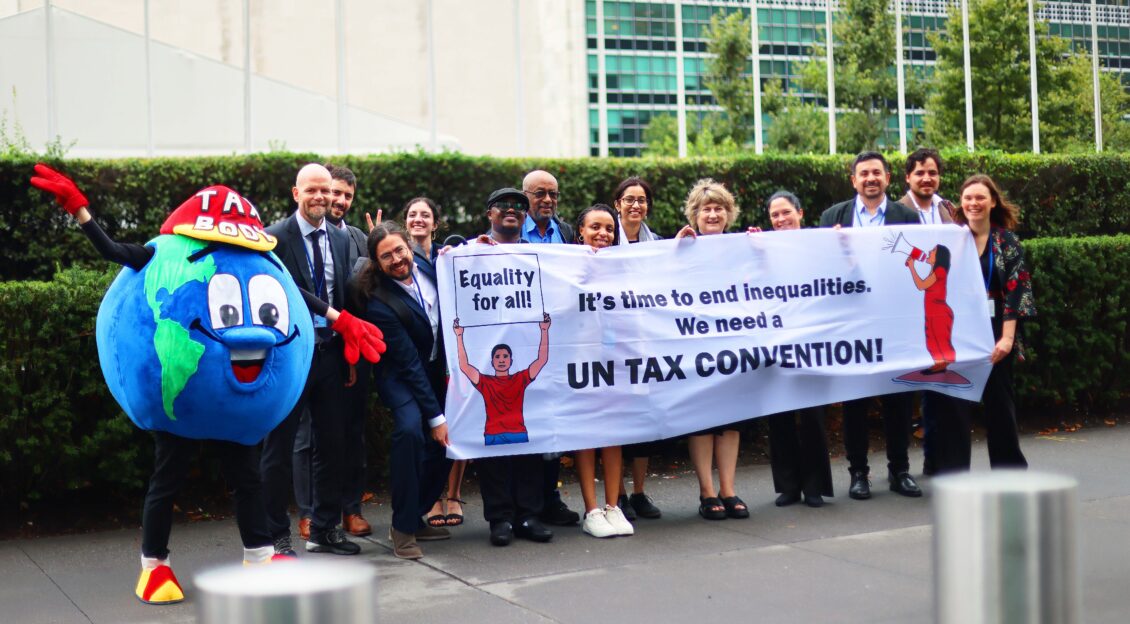By: Dr. Nathalie Beghin and Dr. Dereje Alemayehu*
Participation by civil society organisations, social movements, and trade unions in the UN Framework Convention on International Tax Cooperation (UN Tax Convention) negotiations is essential to strengthen the process and outcome. Civil society works in many ways to improve decision-making and increase accountability. In the UN Tax Convention organisational session and the preceding terms of reference negotiations, civil society shared expertise through joint submissions, interventions on the floor, and daily chronicles for negotiators. However, civil society faced hurdles including a ban on applause and permission for only minimal campaigning. This differs from other processes such as the UNFCCC negotiations where civil society holds actions. As the negotiations begin for a UN Tax Convention, it is critical that civil society is allowed to meaningfully participate.
Civil society participation in the UN Tax Convention negotiations is not just important, it is mandated by the UN General Assembly. In the overwhelmingly adopted Terms of Reference, the mandate of the UN Tax Convention negotiations, the task of civil society is clear: “International organizations, civil society and other relevant stakeholders are encouraged to contribute to the work of the intergovernmental negotiating committee in accordance with established practices.” As such, civil society is part of the negotiations.
Here are five key reasons for civil society’s participation:
- Representation
Civil society organisations, social movements, and trade unions represent those at the forefront of the struggle for tax justice. Governments drained of public resources due to tax abuse and an unfair allocation of taxing rights cannot adequately fund public services and development, realise human rights and gender equality, and support climate finance, directly impacting the daily lives of people around the world. Civil society represents those who understand firsthand this failure in international tax cooperation.
- Legitimacy
The legitimacy of decision-making about global issues at the UN is linked to the role of civil society. The participation of civil society allows for diverse perspectives to be incorporated into the process, greater accountability, and increased public awareness outside of negotiating rooms. A strong civic space increases the legitimacy of this process and leads to better outcomes.
- Expertise
As a broad movement for global tax justice including experts with decades of experience, civil society brings valuable and diverse knowledge about tax systems. By incorporating our civil society proposals, governments are better suited to react to the realities on the ground and the UN Tax Convention process will be stronger for it. As civil society, we have consistently made joint submissions with more than 100 institutional signatories.
- Inclusivity
Civil society, knowing the flaws of the current tax rules and what is at stake, has pushed for inclusive, democratic tax negotiations at the UN. Now, with the work of the Africa Group and G77, these negotiations are the first time where Member States can stand on an equal footing and civil society can participate in international tax discussions, a stark difference from exclusive discussions at the OECD. For a truly inclusive UN Tax Convention, it is necessary for governments to listen in good faith to the proposals of civil society who have consistently pushed for this historic process.
- Transparency
For a transparent, democratic process, it is important to know what governments are discussing to be able to hold them accountable. The development of a UN Tax Convention with civil society participation allows for increased sharing, translation, and discussion of the decisions taken by delegates at the UN.
The Charter of the United Nations begins with “We the peoples”; it is created by and for the peoples of the world. As civil society, we bring the voices of diverse peoples into the negotiations. Now, as the negotiations for a Framework Convention and two early protocols move forward, we as civil society will continue to be here to provide expertise, support, and critiques to ensure that the global tax rules are developed to work for all.
*Dr. Nathalie Beghin is the Co-Director of INESC and a member of Red de Justicia Fiscal de América Latina y el Caribe (RJFALC). Dr. Dereje Alemayehu is the Executive Coordinator of the Global Alliance for Tax Justice (GATJ).
